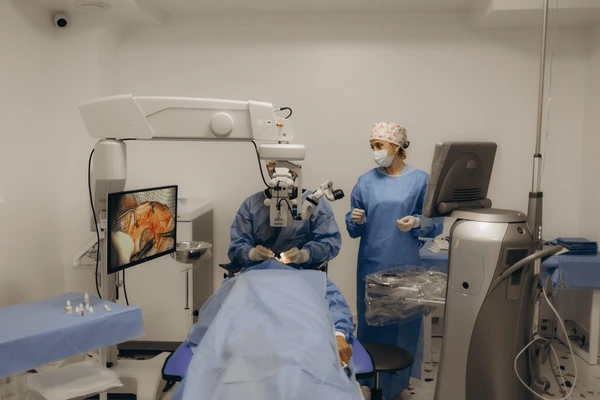A reputed Eye Surgeon explains what neuro-ophthalmology is and why it matters for vision and brain health. Understand signs, diagnosis, and care.
Understanding Neuro-Ophthalmology and Why It Matters
Your eyes don’t work alone — they are deeply connected to your brain. Every time you look at something, millions of nerve signals travel between the eye and brain to form an image. When something disrupts this pathway, vision problems can appear even when the eyes themselves seem healthy. That’s where neuro-ophthalmology comes in.
Neuro-ophthalmology is a highly specialized field that blends neurology (the study of the brain and nerves) with ophthalmology (the study of the eyes). It focuses on vision issues that arise from brain, nerve, or systemic health problems. While not as widely discussed as cataracts or glasses, it’s a critical branch of eye care — especially when symptoms aren’t straightforward.

Why Neuro-Ophthalmology Matters More Than You Think
Many people assume vision loss always starts in the eye itself. In reality, certain vision problems begin elsewhere:
- Brain or nerve disorders can damage the optic nerve or pathways controlling eye movements.
- Systemic illnesses like diabetes or multiple sclerosis sometimes affect vision through the nervous system.
- Serious conditions such as strokes or tumors may first show up as subtle eye symptoms.
By understanding neuro-ophthalmology, you learn to recognize warning signs early and seek timely help.
Common Conditions Neuro-Ophthalmology Deals With
- Optic neuritis — sudden vision loss or pain due to inflammation of the optic nerve.
- Double vision (diplopia) — caused by nerve palsies or brain disorders affecting eye movement.
- Pupil abnormalities — changes in size or reaction that signal nerve or brain issues.
- Papilledema — swelling of the optic nerve head due to raised brain pressure.
- Visual field defects — partial vision loss linked to strokes or tumors.
- Unexplained vision loss — when usual eye tests appear normal but sight is affected.
Signs You Shouldn’t Ignore
Knowing when to see a specialist is crucial. Seek help if you notice:
- Sudden or partial vision loss
- Persistent double vision
- Drooping eyelids or unusual pupil size
- Flashes, floaters, or shadows in your vision
- Frequent headaches with visual changes
- Balance issues or unexplained dizziness with sight disturbance
These may indicate deeper neurological involvement rather than a simple eye problem.
How a Neuro-Ophthalmic Evaluation Works
A specialist performs a thorough, multi-layered examination to find the real cause of vision changes:
- Detailed history & symptom analysis — when and how issues started, related systemic illness
- Comprehensive eye exam — visual acuity, color vision, visual field testing
- Neurological assessment — reflexes, eye movement patterns, pupil responses
- Advanced imaging — MRI, CT scan, or OCT to examine brain and optic nerve
- Blood or systemic tests — if underlying disease is suspected
This holistic approach ensures no hidden neurological issue is missed.
The Role of an Eye Surgeon for Neuro-Ophthalmic Care
Complex neuro-ophthalmic disorders often require advanced diagnostic technology and surgical expertise. The Best Eye Surgeon in Kolkata can bridge general eye care with neurological insight, ensuring you get:
- Accurate cause identification before vision is permanently affected
- Access to modern imaging and minimally invasive surgical techniques when necessary
- Guidance on related systemic conditions and referrals to neurologists or other specialists
- Long-term management plans to preserve sight and quality of life
This integrated care is especially important when conditions like optic nerve compression, tumors, or brain lesions are involved.
Lifestyle and Prevention Tips
Although not all neuro-ophthalmic conditions can be prevented, protecting your overall health and staying alert to symptoms can help:
- Regular eye checkups — especially if you have diabetes, hypertension, or neurological disorders
- Control chronic conditions — keep blood sugar and blood pressure stable
- Protect your eyes and head — wear protective gear during activities with risk of trauma
- Seek prompt medical attention — don’t delay when vision changes or severe headaches appear
- Maintain healthy habits — exercise, sleep well, and eat foods rich in antioxidants and omega-3 fatty acids

FAQs
1. How is neuro-ophthalmology different from regular eye care?
It focuses on vision issues caused by brain, nerve, or systemic problems, not just the eye itself.
2. Can neuro-ophthalmic conditions cause permanent blindness?
Some can if untreated, but early diagnosis and treatment often preserve or improve vision.
3. Is neuro-ophthalmology only for adults?
No. Children with strabismus, unexplained vision loss, or developmental issues may also need neuro-ophthalmic evaluation.
4. What treatments are available?
It varies — from medication and lifestyle changes to surgery for tumors, nerve decompression, or eye alignment.
5. How often should I get checked?
At least once a year if you have chronic illnesses like diabetes or hypertension; sooner if you notice vision or neurological changes.
A Thoughtful Takeaway for Your Vision and Brain
Your vision is more than just healthy eyes — it’s the harmony between your eyes, nerves, and brain. Understanding neuro-ophthalmology empowers you to act early, ask the right questions, and seek specialized help before small signs turn into serious vision loss.
If you’re ever unsure about unusual visual symptoms or headaches that affect sight, reaching out to an experienced specialist such as Dr. Tanmay Biswas, a trusted name in advanced eye care, can make a life-changing difference.

